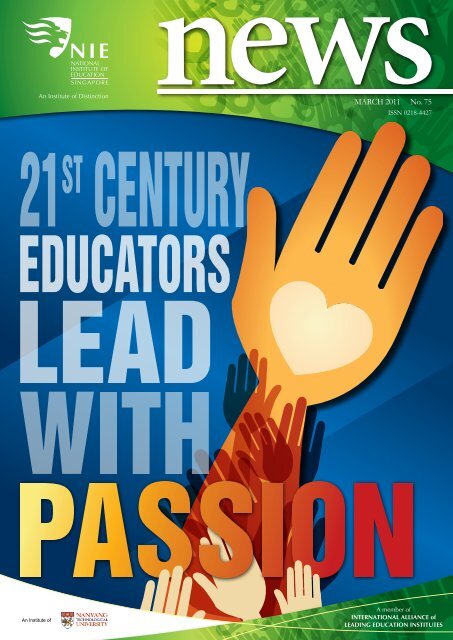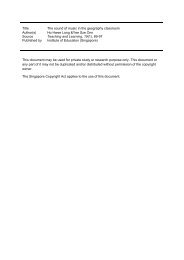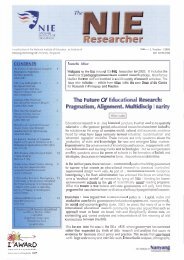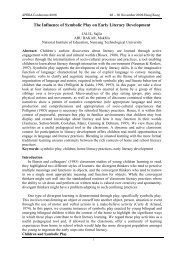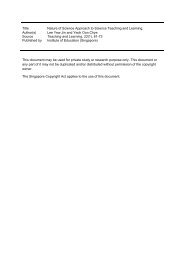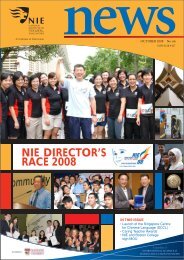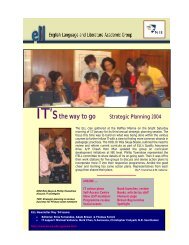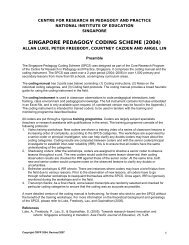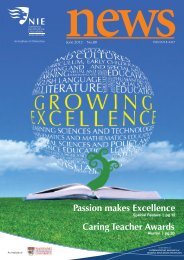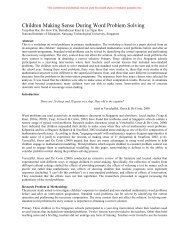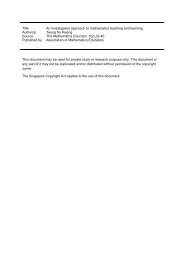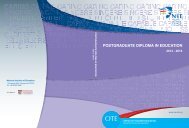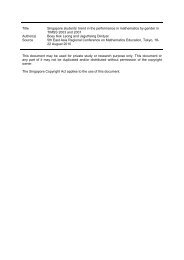MARCH 2011 No. 75 - NIE Digital Repository - National Institute of ...
MARCH 2011 No. 75 - NIE Digital Repository - National Institute of ...
MARCH 2011 No. 75 - NIE Digital Repository - National Institute of ...
Create successful ePaper yourself
Turn your PDF publications into a flip-book with our unique Google optimized e-Paper software.
<strong>MARCH</strong> <strong>2011</strong> <strong>No</strong>. <strong>75</strong>ISSN 0218-4427
Contents02 Editor’s Say03 CORPORATE DEVELOPMENT03 The Secret <strong>of</strong> Finland’s Educational Success04 Urban Education Summit: <strong>NIE</strong> Dean Gives PanelAddress at New York City Hall05 <strong>NIE</strong> Faculty Honoured with Asia-Pacific EducationalResearch Association (APERA) Awards05 The Second Conference Of The Asia-Pacific Consortiumon Chinese Teaching06 <strong>NIE</strong> and SRI (International) Signs Refreshed MOU06 Nurturing Talent Through Value Creation07 E-Fiesta <strong>2011</strong>08 Renowned Golfer Adam Scott Visits <strong>NIE</strong>08 Makeover <strong>of</strong> <strong>NIE</strong> Library Website in <strong>2011</strong>!09 Kudos to <strong>NIE</strong>’s Good Samaritans!09 Prominent Visitors10 SPECIAL FEATURE10 21 st Century Teachers Call for 21 st CenturyTeacher Educators12 RESEARCH12 Transforming Teaching, Inspiring Learning12 Dean’s Commendation for Research14 <strong>NIE</strong> Faculty Garners Renowned TESOL Award forDistinguished Research 201014 Through the Eyes <strong>of</strong> the Child15 Realising an <strong>NIE</strong>-Wide Research Agenda16 ALUMNI16 A Celebration <strong>of</strong> the Passion to Teach!18 Enhancing Pedagogical Skills for Teacher Trainers19 Learning Across the Land: My Fulbright Experience20 Keeping the Passion Alive<strong>NIE</strong> News is published quarterly by the Public, Internationaland Alumni Relations Department, <strong>National</strong> <strong>Institute</strong> <strong>of</strong>Education, Singapore<strong>NIE</strong> News is also available at www.nie.edu.sg/nienewsIf you prefer to receive the online version <strong>of</strong> <strong>NIE</strong> News,and/or update your particulars, please inform:The Editorial Team, <strong>NIE</strong> News1 Nanyang Walk, Singapore 637616Tel: +65 6790 3034 • Fax: +65 6896 8874Email: nienews@nie.edu.sgEditorial TeamDr Christopher Ward, Patricia Campbell, Vivien Lee,Wendy GohPhotographerWilliam OhEditor’s SayThis issue <strong>of</strong> <strong>NIE</strong> News focuses on the 21st Centuryteacher and 21 st Century teacher educators. In his AnnualAddress at the TE 21 Summit, Pr<strong>of</strong>essor Lee Sing Kong,Director, <strong>NIE</strong>, reminded us all <strong>of</strong> the central focus, theimportance <strong>of</strong> equipping teachers with the values, skills andknowledge that will equip our 21 st Century learners with 21 stCentury competencies.To help our learners, the 21 st Century teachers must havegood basic digital skills and be open to the adoption andlearning <strong>of</strong> new technologies that they can use to completetheir administrative work, develop their own knowledge andteaching materials, and inform and motivate their learners.They need to be innovative but focused on what will beuseful to them and their learners.By the time they leave school, our learners need to havedeveloped the right digital skills. Social networking mightbe fun but, on its own, it is insufficient. They also needgood word-processing skills, an ability to use spreadsheets,an eye for communicative layout and skills specific to thepr<strong>of</strong>ession they have chosen.Our learners also need to have the right values in theiruse <strong>of</strong> technology. A recent survey showed that manyyoung people in Singapore did not seem to understand thedangers associated with an online presence that opensthem to abuse. They need help in developing a suitable set<strong>of</strong> ethics that encompasses such things as a respect forother people’s privacy, a recognition <strong>of</strong> intellectual property,an avoidance <strong>of</strong> plagiarism and a distaste for gossip.Finally, our learners need to be discriminating regardingwhat they see or hear. The Internet is a wonderful resourcethrough which we can gather a lot <strong>of</strong> useful information.Unfortunately, it is also a source <strong>of</strong> just as muchmisinformation. Our students haveto learn how to recognise theuseful from the dangerous.Preparing learners in all theseareas has become part <strong>of</strong>the job <strong>of</strong> the 21 st Centuryteacher. It is a big task butnot one that they can avoid.As teacher educators, it isincumbent on us to prepare ourteachers in the same way.The technology is hereto stay. We all need toensure that it is usedsafely, wisely andappropriately.CORPORATEDEVELOPEMENTThe Secret <strong>of</strong> Finland’s Educational SuccessBy Office <strong>of</strong> Education Research<strong>No</strong> examinations and hardly any homework for students.A decentralised school system with no inspectorate. Highstudent performance with few differences between schools.These qualities <strong>of</strong> Finland’s education system never fail toimpress educators each time they are recounted.Finnish Pr<strong>of</strong>essor <strong>of</strong> Education, Pr<strong>of</strong>essor Hannele Niemi,says she is <strong>of</strong>ten asked: “What is our secret?”Is it the free lunch that every student is entitled to each day?The free transport and provision <strong>of</strong> basic materials for school?Or the high level <strong>of</strong> autonomy given to schools and teachers?“The main reason for high quality learning outcomes is highquality teachers,” says Pr<strong>of</strong>essor Niemi, who was invitedto give the fourth CJ Koh Pr<strong>of</strong>essorial Lecture. The publiclecture was held at the NTU Alumni Club on 28 October 2010.Speaking to an audience <strong>of</strong> over 200 teachers and teachereducators, Pr<strong>of</strong>essor Niemi shared insights on the successesand challenges <strong>of</strong> Finland’s education system. While thereis “a complex <strong>of</strong> practices” and “mutually interactive factors”,she noted that the trust invested by Finnish society in theteaching pr<strong>of</strong>ession is vital.“We, as a society, see them as intellectuals and pr<strong>of</strong>essionals,”she explains. “We support and respect them as role models.”The teachers, in turn, are highly committed and have a strongsense <strong>of</strong> responsibility to their stakeholders – students, parents,and society at large.“What about Finnish policies?” asks a member <strong>of</strong> theaudience. “Education policies must constantly adapt tothe education landscape,” says Pr<strong>of</strong>essor Niemi. Sheemphasised that it has taken over 35 years for Finland’sGuests present at the CJ Koh Pr<strong>of</strong>essorial lectureeducation system to develop into what it is today. Thedecentralisation <strong>of</strong> control to individual municipalitiesand schools occurred gradually as their teachers becameincreasingly qualified.This has been due in large part to Finland’s teachereducation programme. All Finnish teachers undergo afive-year research-based Master’s level programme thatintegrates theory and practice. This not only ensures thatthey are grounded in the latest research on pedagogy, butalso equips them to seek and use evidence to analyse thecomplex situations that they face as teachers.Pr<strong>of</strong>essor Niemi also spoke on the topic <strong>of</strong> “MultidisciplinaryResearch on Learning for Promoting Quality in Teaching andLearning” at a seminar for <strong>NIE</strong> staff on 27 October 2010. Sheexplored how learning environments and the very concept<strong>of</strong> learning have changed radically, and what this means forteaching and learning today.The challenge, as Finland has discovered, is to see “life aslearning”. For teachers, this means equipping students withskills for “boundless learning” throughout their lives. Finland’ssuccess continues to challenge us to redefine the boundaries<strong>of</strong> teaching and learning.Pr<strong>of</strong>essor Hannele Niemi is a Pr<strong>of</strong>essor <strong>of</strong> Education atthe University <strong>of</strong> Helsinki. She is also Chair <strong>of</strong> the CrossdisciplinaryInitiative for Collaborative Efforts <strong>of</strong> Researchon Learning (CICERO) Network, which does multidisciplinaryresearch on learning. Over the past twenty years, she hasplayed a leading role in shaping education in Finland, andpublished widely in the area <strong>of</strong> educational research andteacher education.Pr<strong>of</strong>essor Hannele Niemi giving the CJ Koh Pr<strong>of</strong>essorial Lecture2 |<strong>NIE</strong> <strong>NIE</strong> |3
(From right) Dr Curt Carlson, SRI (International), Pr<strong>of</strong>essor Lee Sing Kong, Director,<strong>NIE</strong> and Pr<strong>of</strong>essor Looi Chee Kit, <strong>NIE</strong>, at the signing <strong>of</strong> the MOU between <strong>NIE</strong> andSRI (International)Pr<strong>of</strong>essor Lee Sing Kong, Director, <strong>NIE</strong>, signed anupdated Memorandum <strong>of</strong> Understanding between <strong>NIE</strong> andSRI International (SRI) with Dr Curt Carlson, CEO SRIInternational, on 18th January <strong>2011</strong>.Following the first MOU signed on 13 June 2007, SRI and <strong>NIE</strong>have collaborated over three years with the following signatureaccomplishments:Launching the Math 180 project in which <strong>NIE</strong> facultycontributed mathematics education expertise to the design<strong>of</strong> an integrated mathematics intervention product forstruggling students.Nurturing TalentThe culture and mindset <strong>of</strong> the 21 st Century educationalinstitution is one that fosters students and staff in generatingnew ideas and developing strong process design skills inorder to develop innovations <strong>of</strong> value. <strong>NIE</strong> together withSRI International (SRI) formed a collaboration to addressa number <strong>of</strong> areas in education that impact 21 st Centurylearning. One <strong>of</strong> the areas is the Nurturing Talent Programmethat specifically addresses educators and learners. Withthis in mind, <strong>NIE</strong> and SRI have co-developed and started aworkshop programme that emphasises systematic processesand goals for innovation in education.The recent four-day workshop conducted in September 2010saw participants from the Ministry <strong>of</strong> Education, primaryand secondary schools coming together to glean insightson research-based practices that impact school practices,expose themselves to techniques in creating value and<strong>NIE</strong> and SRI (International)signs refreshed MOUBy Pr<strong>of</strong>essor Looi Chee Kit,Centre <strong>of</strong> Excellence in Learning InnovationDelivering innovation workshops to teachers, schoolleaders and Ministry <strong>of</strong> Education <strong>of</strong>ficials.Further developing the GroupScribbles innovationand building a GroupScribbles scale-up program inSingapore schools.The updated MOU provides for a framework <strong>of</strong> furthercollaboration between SRI and <strong>NIE</strong>, with a view to ensuring aneffective and mutually beneficial co-operation while maintainingalignment with the overall goals, context and strategic aims <strong>of</strong>SRI and <strong>NIE</strong>. Tapping on the strengths <strong>of</strong> SRI and <strong>NIE</strong>, bothparties agree to pursue continued joint activities, including:The joint development <strong>of</strong> a sustainable business model forinnovation workshops;Further research on innovation;Through Value CreationSeeking more funding opportunities to carry out researchon student learning; andIdentifying and exploiting new opportunities beyond Math 180.By Anwar Chan,Centre <strong>of</strong> Excellence for Innovationin Education (COELI)Nurturing Talent Workshop September 2010 Facilitators and Participantsdevelop a greater awareness in recognising opportunities thataid in creating and sustaining innovations in schools.Workshop programme facilitators from both SRI and <strong>NIE</strong>were on-hand to share their knowledge and understandingon frameworks, tools and techniques and experiences withinnovation process tools that participants can use throughouttheir careers.This workshop programme is a fine example <strong>of</strong> how theCentre <strong>of</strong> Excellence in Learning Innovation at <strong>NIE</strong> bringstogether the core strengths <strong>of</strong> both organisations in order tobenefit Singapore’s educators.For more information on the Nurturing Talent Programme,please visit http://www.nie.edu.sg/research-centres/centreexcellence-learning-innovation.By Eric Yeo, Office <strong>of</strong> Teacher Education and Pratima Majal, Centre for E-LearningThe way people access information, communicate andcollaborate online has changed due to easy access to theInternet and a wide range <strong>of</strong> mobile devices. It is crucial tounderstand the implications <strong>of</strong> these developments on theway learners interact online. <strong>NIE</strong>’s e-Fiesta theme providedthe opportunity to consider these challenges in the context <strong>of</strong>teaching and learning with technology that encourages social,open and mobile learning environments.The e-Fiesta <strong>2011</strong> was jointly organised by the Office <strong>of</strong>Teacher Education (OTE), the Centre for e-Learning (CeL)and the Bachelor <strong>of</strong> Science Club (BSc Club). Each year, theevent strives to provide an opportunity for student teachersand lecturers to see what trends are emerging in e-learning inSingapore and beyond.This year the event took place on the 26 January. Theceremony was graced by the presence <strong>of</strong> Pr<strong>of</strong>essor LeeSing Kong, Director, <strong>NIE</strong>. In his opening address, Pr<strong>of</strong>essorLee reiterated that 21 st Century teachers call for 21 st Centuryteacher educators.The pr<strong>of</strong>ile <strong>of</strong> students in schools and the newer generation <strong>of</strong>student teachers are changing. Students and student teachers,being “digital natives”, are technologically savvy and fluentwith the use <strong>of</strong> technology in their everyday lives. Teachersand teacher educators, being “digital immigrants” need tokeep pace with new technologies or risk being disconnectedfrom the new generation if they do not move out <strong>of</strong> the20th Century mindset. <strong>NIE</strong>, as the sole teacher preparationinstitute in Singapore, has to play its part in keeping abreast <strong>of</strong>educational technology.Mr Lim Boon Tat from the Singapore Google Educators Group,and Mr Yee Jenn En, Solutions Engineer from Blackboard Inc,gave interesting keynote presentations during the openingceremony. Mr Lim’s presentation on “A New Paradigm: Openand Social Learning” gave a fresh perspective on how socialnetworking has changed the way people interact and work,Pr<strong>of</strong>essor Lee Sing Kong, Director, <strong>NIE</strong>,said, “<strong>No</strong>body will blame us if we do notknow everything but people will blame usif we do not tap on the potential (<strong>of</strong> usingtechnology in education).”<strong>2011</strong>highlighting that this was an opportunity to connect withand engage learners. He also espoused the idea <strong>of</strong> openlearning and the spirit <strong>of</strong> sharing, so as to optimise creativityand innovation. Mr Yee followed with a showcase <strong>of</strong> the latestin Blackboard functions that allowed easy communicationwith students through mobile technology. The showcaseillustrated that learning could happen anytime and anywherewith mobile technology.With lively panel discussions, best practice demonstrationsand hands-on workshops, participants got the chanceto experience a diverse range <strong>of</strong> e-learning tools andtechnologies specifically focused on social, open and mobilelearning. These included learning in virtual environments suchas Second Life, learning through video games, sharing andlicensing materials under Creative Commons and using mobileaugmented reality applications.The participants found the concurrent sessions highlyengaging and stimulating. Here is a Wordle that summarisedtheir experiences.The organising committee would like tothank all speakers for their time and effort inmaking this annual e-Fiesta a success!<strong>NIE</strong> looks forward toseeing staff andstudent teachersin 2012 for thenext e-Fiesta!6 |<strong>NIE</strong> <strong>NIE</strong> |7
SPECIALFEATURETE 21 Summit featuring Director’s Annual Address:21 st CenturyTeachers Call for 21 st CenturyTeacher EducatorsBy Strategic Planning and Corporate Services DepartmentOn 2 <strong>No</strong>vember 2010, Pr<strong>of</strong>essor Lee Sing Kong, Director,<strong>NIE</strong>, delivered his Annual Address to staff which also kickstartedthe one-day TE 21 Summit event. The TE 21 Summit wasconceived as a platform to share and showcase teaching andresearch initiatives that will be instrumental in keeping <strong>NIE</strong> atthe forefront <strong>of</strong> 21 st Century teacher education.In his address, Pr<strong>of</strong>essor Lee shared <strong>NIE</strong>’s key achievementsunder the five-year strategic plan, better known as the 3:3:3Roadmap, and the significantstrides that have been madein teaching, researchand enabling corporatesupport over the lastthree years. The list<strong>of</strong> accomplishmentscovered the spectrum<strong>of</strong> new programmes, theimpact <strong>of</strong> <strong>NIE</strong>’s leadershipin the internationaleducation fraternity,the growing inroads made by our research endeavours, thestrengthening <strong>of</strong> our relationships with key stakeholders, andthe international awards and accolades bestowed on <strong>NIE</strong>faculty by their peers.With <strong>NIE</strong> at the midway point <strong>of</strong> the 3:3:3 Roadmap, Pr<strong>of</strong>essorLee emphasised that more needs to be done to realise thevision <strong>of</strong> “an institute <strong>of</strong> distinction”. He outlined the four keyinitiatives that will drive our strategy in the next two to threeyears: TE 21 implementation; Research Development andInnovation Masterplan; Enterprise Architecture in tandem withthe Human Capital Masterplan; and LIBRIS21.The theme <strong>of</strong> this year’s Annual Address was “21 st CenturyTeachers Call for 21 st Century Teacher Educators.” With theTE 21 initiative at the core <strong>of</strong> <strong>NIE</strong>’s teaching strategy, Pr<strong>of</strong>essorLee reiterated its importance in enabling <strong>NIE</strong> to play a strategicrole in meeting the changing needs <strong>of</strong> Singapore’s educationsystem. He reminded all staff that in order to transform teachereducation, <strong>NIE</strong>’s faculty must put the 21 st Century learner atthe heart <strong>of</strong> our educational goals and equip teachers with theAre they teaching or go<strong>of</strong>ing around? Staff from the Physical Education and SportsScience Academic Group’s sharing session show you can do both using smart gamesas a pedagogical toolvalues, skills and knowledge that will equip our 21 st Centurylearners with 21 st Century competencies. In calling on allfaculty to adopt the mantle <strong>of</strong> 21 st Century teacher educators,he shared his thoughts on the key attributes that make up a21 st Century teacher educator - one who strives for continuousimprovement in teaching and research; is open to learningand sharing; and more importantly, is a role model to studentteachers. He also encouraged staff to apply relevant andinnovative pedagogies. To move the TE 21 initiative forward,he stressed that a culture <strong>of</strong> sharing and learning must beestablished within <strong>NIE</strong>. Platforms need to be created forAcademic Groups (AGs) and faculty members to shareand learn about best practices. <strong>NIE</strong> must also leverage oninformation from research to improve our programmes.The TE 21 Summit which followed Pr<strong>of</strong>essor Lee’s Addressexemplified the kind <strong>of</strong> sharing platform that hopefully willbecome an integral feature <strong>of</strong> the academic landscape within<strong>NIE</strong>. The programme comprised a line-up <strong>of</strong> presentations,workshops and sharing sessions by <strong>NIE</strong> staff, MOE policy<strong>of</strong>ficers and external trainers. Pr<strong>of</strong>essor David Hogan, PrincipalResearch Scientist, Office <strong>of</strong> Education Research, presenteda session on “Current and Future Pedagogies in SingaporeSchools”, which was followed by sharing by the e-PortfolioHands up if you’re having fun! <strong>NIE</strong>’s management and corporate services <strong>of</strong>ficers getinto the swing <strong>of</strong> things at a workshop tailored for themproject team on the pilot and its anticipated impact on <strong>NIE</strong>’sITP programmes. Three MOE divisions were invited to sharethe latest developments on key initiatives for 21 st CenturyCompetencies, ICT in Schools and Holistic Assessmentunder PERI. All AGs mounted sharing sessions on their goodpedagogies which were as varied as using games, videos andother alternative approaches to teaching and learning.Management and corporate services <strong>of</strong>ficers (MCSO) hada programme specially tailored to encourage them to tapinto their creativity and unearth their innovative talents.Recognising that MCSOs play a crucial role in supporting<strong>NIE</strong>’s teaching and research strategy goals, they too must beequipped with the right skills and tools to achieve higher levels<strong>of</strong> performance.In an evaluation survey conducted after the Summit,respondents gave an enthusiastic ‘thumbs up’ for the event.They appreciated Director’s Annual Address for the insightit provided on <strong>NIE</strong>’s achievements and ongoing strategicinitiatives as well as the opportunity to play a role, as members<strong>of</strong> the <strong>NIE</strong> community, in contributing to its success. Manyideas and suggestions were also forthcoming in how futureevents could shape up.Pr<strong>of</strong>essor David Hogan, PrincipalResearch Scientist, Office <strong>of</strong>Education Research (OER)addressing the audience on OER’sresearch findings on “Current andFuture Pedagogies in SingaporeSchools”Pr<strong>of</strong>essor Looi Chee Kit, Head, Centre <strong>of</strong> Excellence for Learning Innovation, sharingresearch-based innovations in schools, highlighting mobile-learning projectsCentre for e-Learning staff showcasing how iPads could be the next big thing inclassroom learningPr<strong>of</strong>essor Lee Sing Kong, Director, <strong>NIE</strong>, sharing <strong>NIE</strong>’s key achievements under the3:3:3 Roadmap in his address to staff10 |<strong>NIE</strong> <strong>NIE</strong> |11
TRANSFORMINGTEACHING,INSPIRING LEARNINGBy Office <strong>of</strong> Teacher EducationCome join us at the fourth Redesigning Pedagogy InternationalConference from 30 May to 1 June <strong>2011</strong>, based on the themeTransforming Teaching, Inspiring Learning.Organised and hosted by <strong>NIE</strong>, this series <strong>of</strong> conferences providesa global forum for practitioners, researchers, educational leadersand policy makers to interact and share leading-edge research andbest practices across schools and cultures.This year’s conference features eminent scholars, who will bedelivering these keynote addresses:Learning Through Doing: The Practices <strong>of</strong> ImprovementResearch by Dr Anthony Bryk, President, The Carnegie Foundation for the Advancement <strong>of</strong> Teaching, USAAssessment and Teaching <strong>of</strong> 21 st Century Skills by Pr<strong>of</strong>essor Patrick Griffin, Director <strong>of</strong> Assessment Research Centre,Associate Dean Strategic Projects, Chair <strong>of</strong> Education (Assessment), The University <strong>of</strong> Melbourne, AustraliaSameness and Differences in Learning by Pr<strong>of</strong>essor Ference Marton, Pr<strong>of</strong>essor Emeritus, University <strong>of</strong> Gothenburg, SwedenTeaching as a Clinical Practice: Using Data But <strong>No</strong>t Blinkered By It by Pr<strong>of</strong>essor Barry McGaw, Chair, Australian Curriculum,Assessment and Reporting Authority, Melbourne Graduate School <strong>of</strong> Education, The University <strong>of</strong> Melbourne, AustraliaThe Strategic Education Research Partnership: A New Approach to Educational Research by Pr<strong>of</strong>essor Catherine Snow,Patricia Albjerg Graham Pr<strong>of</strong>essor <strong>of</strong> Education, Harvard Graduate School <strong>of</strong> Education, Harvard University, USADetails and updates are available at http://conference.nie.edu.sg.Dean’s Commendation for ResearchBy Office <strong>of</strong> Graduate Studies and Pr<strong>of</strong>essional Learning(Front row, third from left) Associate Pr<strong>of</strong>essorKoh Chong Lek, Sub-Dean, Graduate Studiesand Pr<strong>of</strong>essional Learning (GPL), Pr<strong>of</strong>essorPaul Teng, Dean, GPL and Pr<strong>of</strong>essor Lee SingKong, Director, <strong>NIE</strong> posing with winnersPhDName Academic Group Supervisor (s)1 MRS KOK ESTHER CORNELIA MRS JOOSA ECSE Dr Susan Kay Wright2 MS TAN SING YEE ECSE Dr Karen Philomena <strong>No</strong>nis3 MDM LEE CHIEN CHING LST Dr Tan Seng Chee4 MDM YEO AI CHOO JENNIFER LST Dr Tan Seng Chee5 MR DENG FENG LST Dr Chai Ching Sing6 MR YEO BOON WOOI JOSEPH MME Dr Foong Pui Yee7 MISS LEE WAN YEN NSSE Dr Lee Peng Foo, PeterDr Yan Yaw Kai (Co supervisor)8 MISS OON PEY TEE NSSE Dr Subramaniam S/O Ramanathan9 MISS PAN ZHENYING NSSE Dr Rajdeep Singh RawatDr Lee Choon Keat, Paul(Co supervisor)10 MISS SHUMAILA KARAMAT NSSE Dr Rajdeep Singh RawatDr Lee Choon Keat, Paul(Co supervisor)11 MR ASHOOTOSH TRIPATHI NSSE Dr Tan Lik Tong12 MR TEO CHIN CHYE NSSE Dr Tan Swee Ngin13 MS YONG FUI FONG NSSE Dr Teo Yong ChuaDr Yan Yaw Kai (Co supervisor)14 MISS NIDHI GUPTA PESS Dr Govindasamy BalasekaranOn 20 January <strong>2011</strong>, a group <strong>of</strong> proud <strong>NIE</strong> higher degreestudents were awarded the Dean’s Commendation forResearch. They were recognised for having excelled intheir research by publishing papers in peer-reviewedinternational journals or international refereed book chaptersduring their period <strong>of</strong> candidature. The ceremony was heldin <strong>NIE</strong> with Pr<strong>of</strong>essor Lee Sing Kong, Director, <strong>NIE</strong>, as theGuest <strong>of</strong> Honour.The Dean’s Commendation for Research was instituted inJanuary 2008 to encourage publication <strong>of</strong> high quality articleson research done by higher degree students. The recognitionwhich takes the form <strong>of</strong> a certificate, is given every semesterto deserving students whose names are nominated by theirsupervisors. Their publications are then judged by a panelchaired by the Dean <strong>of</strong> Graduate Studies & Pr<strong>of</strong>essionalLearning, Pr<strong>of</strong>essor Paul Teng. The panel members consist<strong>of</strong> Heads <strong>of</strong> Academic Groups or their representatives,Associate Dean (Higher Degrees), and Sub Dean (HigherDegrees by Research).For the August 2010 semester, twenty-seven nominationswere received, and a total <strong>of</strong> twenty-four commendationcertificates were presented to nineteen recipients, some <strong>of</strong>whom had multiple publications. (see facing page.)MSc (by Research)Name Academic Group Supervisor (s)1 MISS GISSELLA BAHOYO LEBRON NSSE Dr Augustine Tan Tuck Lee2 MR PEH YI CHING, SHAWN PESS Dr Chow Jia YiMA (by Coursework & Dissertation)Name Academic Group Supervisor (s)1 MDM LAWRENCE CHRISTINE ANNE PS Dr Chong Wan Har12 |<strong>NIE</strong> <strong>NIE</strong> | 13
Associate Pr<strong>of</strong>essorLawrence Zhang from theEnglish Language andLiterature Academic Grouphas won the prestigiousTESOL Award forDistinguished Research2010. Associate Pr<strong>of</strong>essorZhang, who joins an illustrious list <strong>of</strong> eminent linguists andrenowned language educators, is the first and only scholarfrom Singapore to be conferred the award. TESOL selectsonly one paper for this prestigious award each year.Associate Pr<strong>of</strong>essor Zhang is selected as the sole awardrecipient by the largest international English languageteaching pr<strong>of</strong>essional body, Teachers <strong>of</strong> English to Speakers<strong>of</strong> Other Languages, Inc. (TESOL), for his seminal paper“A Dynamic Metacognitive Systems Account <strong>of</strong> ChineseUniversity Students’ Knowledge About EFL Reading”. Thispaper was published in the international refereed journal,TESOL Quarterly, a leading journal in the field <strong>of</strong> Englishlanguage teaching and research, which is ranked by theSSCI-Index and the Journal Citation Reports (JCR).“I am deeply honoured and humbled to have been chosento receive such an important award for my research,” saidAssociate Pr<strong>of</strong>essor Zhang.RESEARCH<strong>NIE</strong> Faculty Garners RenownedTESOL Award for DistinguishedResearch 2010By Public, International and Alumni Relations DepartmentIn his research, Associate Pr<strong>of</strong>essor Zhang highlighted theimportance <strong>of</strong> metacognition in language learning. He arguedthat metacognition as a set <strong>of</strong> dynamic systems has beenrecognised as an important area <strong>of</strong> inquiry in TESOL/appliedlinguistics. <strong>No</strong>netheless, he noted that literature on students’metacognition about second language (L2) reading is stillcursory. Since globalisation has resulted in many Chinese-asa-first-languagestudents becoming transnationals pursuingacademic studies in English, predominantly in Westerncountries, and the increasing importance <strong>of</strong> metacognition inapplied linguistics research from both theoretical and practicalperspectives has been emphasised, his study significantlycontributes to researchers’ and teachers’ understanding <strong>of</strong> L2learners from such backgrounds.Reporting findings from an interview study <strong>of</strong> twenty L2learners’ reading experiences framed within a dynamicmetacognitive systems perspective, Associate Pr<strong>of</strong>essorZhang has found that there is a strong relationship betweenmetacognition and successful L2 reading comprehension, andthat the successful and the less successful L2 students aredifferent in the amount and the quality <strong>of</strong> the metacognitiveknowledge they possess. His research findings areexpected to provide significant insights into research by, andpedagogical practices <strong>of</strong> English educators working with suchlearners around the world.Realising an <strong>NIE</strong>-Wide Research AgendaBy Lin Ai-Leen, Office <strong>of</strong> Education ResearchA strategic Research, Development and Innovation (RD&I)framework has been developed to guide <strong>NIE</strong>’s researchagenda for the period 2008–13. This framework represents<strong>NIE</strong>’s commitment to a policy-driven and evidence-basedresearch agenda.Led by the Office <strong>of</strong> Education Research, the RD&I agendacorresponds with the second tranche <strong>of</strong> funding providedby the Ministry <strong>of</strong> Education to conduct research andimplement sustainable pedagogical andorganisational innovations thatwill impact on policy formulationand pedagogical practices inSingapore schools.The formulation <strong>of</strong> thisframework was influenced byfour sets <strong>of</strong> considerations:Government policy settings;the changing educationallandscape and strategicchallenges in Singapore;findings from <strong>NIE</strong>’sresearch activities between2004 and 2006; and <strong>NIE</strong>’sresearch capacities.The RD&I agendafocuses ourresearch efforts on four niche areas: pedagogy (curriculum,assessment, teaching, technology, instructional design);leadership (and organisational change); domain-specific/disciplinary research; and teacher learning (pre-serviceeducation and in-service pr<strong>of</strong>essional development).Specifically, <strong>NIE</strong> commits to the following RD&I agenda:to undertake detailed research on classroom pedagogy,encompassing knowledge and the curriculum,assessment, technology and learning environments,teaching and instructional design, and classroomorganisation and management;to measure and map student outcomes, both academicand non-academic, and model the impact <strong>of</strong> pedagogy onstudent outcomes;to design technology-rich learning environments and tools;to develop and carry out a programme <strong>of</strong> evidence-basedinterventions designed to build teacher capacity, improveclassroom practice, and enhance student outcomes in linewith government policy; andto facilitate evidence-based policy and programmedevelopment and implementation.To date, <strong>NIE</strong> has a total <strong>of</strong> 102 funded research projects ledby Principal Investigators across <strong>NIE</strong>’s academic groups andresearch centres. Over 60% <strong>of</strong> these projects focus on thearea <strong>of</strong> pedagogy and classroom practice.Through the Eyes <strong>of</strong> the ChildBy Associate Pr<strong>of</strong>essor Rita Silver, English Language and Literature Academic GroupOn 17 January <strong>2011</strong>, an exhibit entitled Through the Eyes <strong>of</strong>Three projects were represented in the exhibit:The exhibit was a unique opportunity to showcase ways that artcan be usedthe Child opened at the <strong>NIE</strong> Art Gallery. Organised by <strong>NIE</strong>staff, Esther Joosa and Pr<strong>of</strong>essor Susan Wright from theEarly Childhood and Special Needs Education AcademicGroup and Associate Pr<strong>of</strong>essor Rita Silver from the EnglishLanguage and Literature Academic Group, the exhibit broughttogether work <strong>of</strong> children (in school and out <strong>of</strong> school) and<strong>of</strong> Masters level students in our pr<strong>of</strong>essional developmentprogramme. The exhibit was held from 17 to 28 January withArtwork by children <strong>of</strong> <strong>NIE</strong> staff, commemorating the 60thAnniversary <strong>of</strong> <strong>NIE</strong> (facilitated by Esther Joosa);Drawings and stories <strong>of</strong>, fifty Primary Two children involvedin a research project funded by the Office <strong>of</strong> EducationResearch, Curriculum Implementation in Early PrimarySchooling in Singapore (facilitated by Associate Pr<strong>of</strong>essorRita Silver and Pr<strong>of</strong>essor Susan Wright); andin educational contexts to facilitate learning, as representationsand <strong>of</strong> children’s voices in educational contexts, as part <strong>of</strong> moreholistic education and to latch on to MOE initiatives such asPERI. In addition, the exhibit was unique in bringing togethersponsorships from Early Childhood and Special NeedsEducation, English Language and Literature, and Visual andPerforming Arts Academic Groups, and Office <strong>of</strong> EducationResearch/Centre for Research in Pedagogy & Practice.<strong>of</strong> learningan associated seminar for teachers, Raising the Pr<strong>of</strong>ile <strong>of</strong> Arts-Masks made by pre-service teachers in <strong>NIE</strong> MastersThis was an exciting showcase <strong>of</strong> institutional collaboration,Based Research and Practice in Singapore, led by Joosa andlevel course, Teachers as Arts Researcher (facilitated bypedagogy-research linkage and the possibilities <strong>of</strong> integratingPr<strong>of</strong>essor Wright on 17 January.Pr<strong>of</strong>essor Susan Wright and Esther Joosa)arts-based practices in education.14 |<strong>NIE</strong> <strong>NIE</strong> |15
By Wendy Goh,Public, International and Alumni Relations DepartmentA total <strong>of</strong> 452 newly-qualified teachers received their <strong>NIE</strong>diplomas at the Teachers’ Investiture Ceremony, graced by thepresence <strong>of</strong> Mr Masagos Zulkifli, Minister <strong>of</strong> State, Ministry <strong>of</strong>Education and Ministry <strong>of</strong> Home Affairs, at the NTU NanyangAuditorium on 15 February <strong>2011</strong>. Some 21% <strong>of</strong> the graduandsare mid-career switchers aged 28 years and older who held atleast a first degree.The Valedictorian for this cohort, Wong Shing Kit, is one suchmid-career switcher. “It may sound like a cliché, but to me,being a teacher is really a calling. It is true that the accountingindustry rewards me better in monetary terms, but theintangible rewards and the sense <strong>of</strong> satisfaction that teachingALUMNIA Celebration <strong>of</strong> thePassion(From left) Associate Pr<strong>of</strong>essor Steven Tan, Associate Dean, Office <strong>of</strong> Graduate Studiesand Pr<strong>of</strong>essional Development, <strong>NIE</strong>; Pr<strong>of</strong>essor Tan Oon Seng, Dean, Office <strong>of</strong> TeacherEducation, <strong>NIE</strong>; Pr<strong>of</strong>essor Er Meng Hwa, Senior Associate Provost, NTU; Dr Koh <strong>No</strong>iKeng, Humanities and Social Studies Education Academic Group, <strong>NIE</strong>; Mr Marcel Lee,Principal, St Gabriel’s Secondary School and Pr<strong>of</strong>essor Lee Sing Kong, Director, <strong>NIE</strong>to Teach!<strong>of</strong>fers are what I value the most,” said Mr Wong, who gave upan accounting career to become a teacher.“<strong>NIE</strong> has equipped these teachers with the Skills, Valuesand Knowledge to bring about relevance in our 21 st Centuryenvironment. To inspire and be inspired is what I believe yourpassion will do for you to meet the challenges in your teachingcareers,” said Pr<strong>of</strong>essor Lee Sing Kong, Director, <strong>NIE</strong>.The Teachers’ Investiture Ceremony not only celebratesgraduands’ achievements in completing the initial teacherpreparation programme but, more importantly, it marks thebeginning <strong>of</strong> their journey as qualified teachers in the educationservice. The event ended with the graduands reciting theTeachers’ Pledge, led by Ms Ho Peng, Director-General<strong>of</strong> Education, Ministry <strong>of</strong> Education. The Pledge serves toreinforce their commitment to uphold the values <strong>of</strong> the teachingpr<strong>of</strong>ession, which is to Lead, Care and Inspire students.<strong>NIE</strong> congratulates all newly graduated teachers!Why did youchoose toteach?“I chose to join teaching because I had a lot <strong>of</strong> good memories <strong>of</strong> my secondary school daysand wish to create the right environment for my students to create their own good memories<strong>of</strong> their school days.”Tan Han Yu Melvin, PGDE (Secondary/Junior College), Winner <strong>of</strong> Singapore Association forthe Advancement <strong>of</strong> Science Prize, currently teaches in Victoria SchoolWhat qualities shoulda 21 st Century Teacher possess?“An undying passion, a lot <strong>of</strong> patience, unlimited creativity and a short attention span.These are the ‘survival’ qualities that I believe have to be ingrained into the 21 st Centuryteacher ... An “undying passion” is more crucial to sustain a teacher in today’s teachingfield. We are in a day and age where information on almost everything can be found witha simple click <strong>of</strong> the mouse, hence teaching is not just letting students learn knowledge butit’s a matter <strong>of</strong> truly being able to ignite a real interest in them for the subject matter. “Justina Ang, winner <strong>of</strong> Geography Teachers’ Association <strong>of</strong>Singapore Book Prize, currently teaches in Pioneer Secondary School“Students in the 21 st Century are the “<strong>Digital</strong> Natives” who grew up surrounded bycomputers and electronic gadgets. As they have access to almost any kind <strong>of</strong> informationvia the Internet, the traditional way <strong>of</strong> “chalk-and-talk” teaching can no longer capture theirattention. Teachers in the 21 st Century have to be equipped with the knowledge in ICTand be able to leverage on it to make lessons more engaging and interesting. Personally,I would also expose myself to the activities that students are engaged in, so that we canspeak the same language …”Wong Shing Kit, winner <strong>of</strong> London Chamber <strong>of</strong> Commerce and Industry (LCCI) Prize,currently teaches in East View Secondary SchoolHow would you motivatea 21 st Century student?“To motivate a 21 st Century student, we have to learn to relate the teaching subject totheir experiences and what they are familiar with. Constant encouragement, couplewith focus on self-improvement rather than grades, has also proved to be effective instimulating positive instrinsic motivation within students.”(From left) Pr<strong>of</strong>essor Lee Sing Kong, Director, <strong>NIE</strong>; Guest <strong>of</strong> Honour, Mr Masagos Zulkilfi,Minister <strong>of</strong> State, MOE; Mrs Tan Ching Yee, Permanent Secretary, MOE and <strong>NIE</strong> CouncilChairperson; Mr Khoo Chin Hean, <strong>NIE</strong> Council Deputy Chairman and Pr<strong>of</strong>essor Er MengHwa, Senior Associate Provost, NTU are all robed and ready for the Academic ProcessionPrize winners <strong>of</strong> the January 2010 cohort: (from left) Wong Shing Kit, Tan Chin Guan,Kam Li Ying, Lin Minglei and Justina Tan with Pr<strong>of</strong>esor Lee Sing Kong, Director, <strong>NIE</strong>and Ms Ho Peng, Director-General <strong>of</strong> Education, MOE.Who saysteachersare notfunpeople?Lin Minglei, winner <strong>of</strong> Association <strong>of</strong> Mathematics Educators Book Prize, currentlyteaches in Xinmin Secondary School16 |<strong>NIE</strong> <strong>NIE</strong> |17
ALUM<strong>NIE</strong>nhancing Pedagogical Skillsfor Teacher TrainersBy Bryan Ang, <strong>NIE</strong> Internationaleducators. The participants gained the necessary skills toenhance their teaching practice and essential concepts andtechniques for promoting and assessing creative thinking in alearning environment. They participated in interactive lecturesand discussions, discovering different pedagogy approaches.Based on their specialisations, primary teacher trainers madea visit to Rivervale Primary School while secondary teachertrainers visited Greenridge Secondary School. The participantsexperienced ‘on-the-ground’ Singapore Education, or, as whichone participant succinctly put it, ‘theories in practice’.As part <strong>of</strong> Singapore’s continuous engagement with the rest<strong>of</strong> the world, the Enhancing Pedagogy Skills for TeacherTrainers course was a success. <strong>NIE</strong> would like to thankIn January <strong>2011</strong>, <strong>NIE</strong> welcomed twenty-three participants from the Ministry <strong>of</strong> Foreign Affairs, Singapore, for funding thedifferent countries who attended the Enhancing Pedagogy teaching programme and the participants under the SingaporeSkills for Teacher Trainers course. This train-the-trainer course Cooperation Programme (managed by the Technicalwas conducted from 10 to 21 January <strong>2011</strong> at the <strong>NIE</strong> Campus. Cooperation Directorate).School leaders and senior teachers were selected from adiverse range <strong>of</strong> schools, training institutes and ministries, withteaching backgrounds spanning from early childhood studiesto tertiary subjects. Their roles were to train and superviseteachers, looking after the quality <strong>of</strong> their pedagogy. Theseparticipants came from different areas <strong>of</strong> specialisation as well,such as English Language, Natural Sciences, Mathematicsand Humanities.Even though the participants came from diverse backgroundsand cultures, the common trait was their passion to learn asmuch as they could and share their experiences with otherParticipants <strong>of</strong> the Enhancing Pedagogy Skills for Teacher Trainers on <strong>NIE</strong> Campus (top photo) and on one <strong>of</strong> their school visits to Greenridge Secondary School (middle and bottom photo)(From left) Dr Ayelet Baram-Tsabari (visiting scholar from the Techion University in Israel), Ms Maya Patel (doctoral candidate),Mr Daniel Capps (doctoral candidate), Associate Pr<strong>of</strong>essor Barbara Crawford and Assistant Pr<strong>of</strong>essor Tan Aik LingLearning Across the Land:My Fulbright ExperienceAssistant Pr<strong>of</strong>essor Tan Aik Ling, Natural Sciences and Science Education Academic GroupI was privileged to be attached to Cornell University towork with Associate Pr<strong>of</strong>essor Barbara Crawford fromSeptember to <strong>No</strong>vember 2010. This attachment was madepossible by the Fulbright Association under the FulbrightResearcher Programme.During my attachment, I taught Cornell students who werepursuing their teaching certification. We had many hours <strong>of</strong>intellectual sparring and debates about science as inquiryas well as the different strategies for creating an inclusiveclassroom for students from diverse backgrounds.I also spent time in middle school classrooms observingschool life in the United States. As part <strong>of</strong> my research, ICalendar <strong>of</strong> Eventsinterviewed middle school students about their knowledgeand attitudes toward the environment they lived in. I will bereplicating the study in Singapore so that a comparison canbe made.In my three months in Ithaca, I had the opportunity to interactwith Cornell graduate students, faculty, teachers, students,bus drivers and many others and developed a betterunderstanding <strong>of</strong> American culture and way<strong>of</strong> life. It was a meaningful and fruitfulexperience for me and I am gratefulto the Fulbright Associationand <strong>NIE</strong> for making thispossible for me.EventDateVenueContact PersonCurriculum Forum13 May<strong>NIE</strong>, SingaporeDr Jasmine Sim, CTLEmail: jasmine.sim@nie.edu.sgRedesigning PedagogyInternational Conference <strong>2011</strong>30 May – 1 June<strong>NIE</strong>, SingaporeMs Shirley SeetEmail: Shirley.seet@nie.edu.sg18 |<strong>NIE</strong> <strong>NIE</strong> |19
Keeping theALUMNIBy Teo Li Lian, Public, International and Alumni Relations DepartmentOn 24 February, 140 in-service teachers received theircertificates for completing the Management and Leadershipin Schools (MLS) programme. The MLS participants includedHeads <strong>of</strong> Department and teachers who are leaders in onearea or another in their schools.Managed by <strong>NIE</strong>’s Office <strong>of</strong> Graduate Studies and Pr<strong>of</strong>essionalLearning, the MLS is a four-month programme that preparesmiddle-level leaders in schools to be exemplary leaders,people managers, and experts in teaching and learning.With the increasing demands placed on teachers by theirstudents, parents and Principals, how do these teacherssustain their passion for teaching through the years?Let’s find out how some <strong>of</strong> our MLS participantskeep their passion alive.Teachers are generally passionate in their work as educators to start with. Clarity incommunication, support in their work, and allowing them to develop in their areas <strong>of</strong>interest and strengths are important in keeping work meaningful. When they experienceautonomy in their work, and are given opportunity to do what they are interested in (<strong>of</strong>course, aligned with school and departmental goals), they are able to keep their personalvision <strong>of</strong> education and work alive; and in doing so, remain passionate.Tom Chan, Bukit Panjang Government High School(From left) Sharifah Samirah Binte Syed Mohamad, Junyuan Primary School; OngChor Meng, Townsville Primary School; Loh Bin, Rivervale Primary School; MiriamWun, Unity Primary School and Ratni Suriyani Binte Saib, Hougang Primary SchoolFor Sharifah and team, “The desire to make a difference inour pupils’ lives as well as in our own lives is what keeps usgoing. Teaching is indeed a calling and it has to come fromthe heart. After all, the child is at the heart <strong>of</strong> all we do and weare tasked to mould them.”I find myself learning a lot from the students, especially in the use<strong>of</strong> information communication technologies and new media, and in turnseeing how I could also adopt some <strong>of</strong> the ideas that they have in myteaching as well. This dynamic exchange <strong>of</strong> ideas and mutual learninghelps me to understand the learning needs <strong>of</strong> my students better andsustains my passion and motivation to grow continuouslyas an educator.Shirley Ong, CHIJ Secondary (Toa Payoh)(From left) Shirley Ong, CHIJ Secondary (Toa Payoh), Tan Geok Hoon,Hua Yi Secondary School, Ho Su Siew, CHIJ Katong Convent and ZhouQian, CHIJ St Nicholas Girls’ School (Secondary)I enjoy the moments I have with my students and it is interesting to view life from their perspectives as we engage in discussionseither in the classrooms or after-lesson conversations. This rapport with my students has kept me going and their smiles andnods <strong>of</strong> greeting me and the tinkling sparks in their eyes when they learnt something new have always made my day.Ho Su Siew, CHIJ Katong Convent20 |<strong>NIE</strong>


